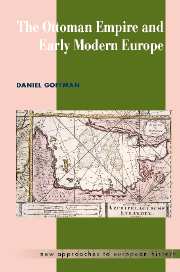Book contents
- Frontmatter
- Contents
- List of illustrations
- List of maps
- Preface
- Acknowledgements
- Note on usage
- Chronological table of events
- The Ottoman House through 1687
- 1 Introduction: Ottomancentrism and the West
- Part 1 State and society in the Ottoman world
- Part 2 The Ottoman Empire in the Mediterranean and European worlds
- Glossary
- Suggestions for further reading
- Index
- NEW APPROACHES TO EUROPEAN HISTORY
1 - Introduction: Ottomancentrism and the West
Published online by Cambridge University Press: 05 June 2012
- Frontmatter
- Contents
- List of illustrations
- List of maps
- Preface
- Acknowledgements
- Note on usage
- Chronological table of events
- The Ottoman House through 1687
- 1 Introduction: Ottomancentrism and the West
- Part 1 State and society in the Ottoman world
- Part 2 The Ottoman Empire in the Mediterranean and European worlds
- Glossary
- Suggestions for further reading
- Index
- NEW APPROACHES TO EUROPEAN HISTORY
Summary
One chapter in a recent history of the Ottomans begins with the assertion that “the Ottoman Empire lived for war.” This statement constitutes a concise précis of a damaging and misleading stereotype, long pervasive in both Europe and the United States. Pursuing this thesis of an acute Ottoman militancy, the author explains that “every governor in this empire was a general; every policeman was a janissary; every mountain pass had its guards, and every road a military destination.” Not only were officials also soldiers, this account declares, but “even madmen had a regiment, the deli, or loons, Riskers of their Souls, who were used, since they did not object, as human battering rams, or human bridges.” Indeed, according to this same writer, it was “outbreaks of peace [that] caused trouble at home, as men clamoured for the profit and the glory.” Although these and similar observations strictly speaking may not be wholly false, they certainly are partial (deli in modern Turkish indeed suggests “loony” or “deranged”; in Ottoman Turkish, however, a more accurate translation would be “brave” or even “heroic”), dangerously credible, and confirm long-lived Western assumptions that the Ottoman state was thoroughly and relentlessly martial. Even more misleadingly, they imply that such militarism was somehow peculiarly foreign and contrary to Western norms.
The truth is that such portrayals not only privilege a single aspect of a rich and varied world, but also could describe virtually any state in early modern Europe.
- Type
- Chapter
- Information
- The Ottoman Empire and Early Modern Europe , pp. 1 - 20Publisher: Cambridge University PressPrint publication year: 2002
- 1
- Cited by

